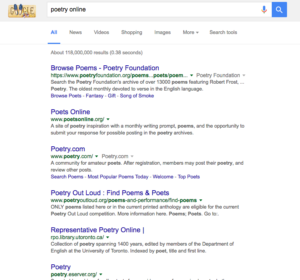I imagine that the Internet has really changed the way that poetry is read. The Poetry Foundation and The Academy of American Poets websites, along with countless other pages for accessing poetry, provide readers vast quantities of poetry. We do not have to go to a library or bookstore, but can read an enormous number of poems from our homes as long as we are connected to the Internet. Sometimes I am overwhelmed by the number of poets who I see represented on websites like those, unsure of where to turn. The Poetry Foundation will email you one poem each day if you simply sign up on an email list. I wonder if this fosters excitement about the breadth of the material that exists or dulls the value of each poem. Still, it is easier to find new poets when they pop up on the edge of the screen as you’re reading a poem written by one author, or if you can read the Wikepedia page of one poet to see which other poets inspired their work.
When poems are read online, they are often isolated, or within a list of poems categorized by author. In a collection however, even if you only want to read one poem, you still must flip through the pages where the others are printed. The meaning of poems is much different when they are oriented within a collection, and when that they stand alone. I wonder whether the new online poetry world has influenced the way that poets construct their collections, or if it has other impacts on the way that poetry is crafted.

